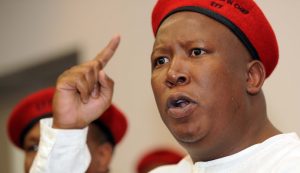

South Africa stands at the coalition T-junction that has been on the cards for many years. The big decision now is whether we turn right or left.
The ANC’s virtual implosion and the meteoric rise of the uMkhonto weSizwe party (MKP) have changed the pre-election coalition permutations.
If the EFF and MKP are included in any coalition, South Africa will take the left (in an economic sense) path. This path will see more developmental state policies where the government controls virtually every aspect of the economy.
It will be a disaster, not only from a policy perspective but also due to poor implementation. The private sector’s role in fixing service delivery shortcomings will also be greatly reduced.

EFF Leader Julius Malema
Conversely, if these parties are excluded from a coalition, the path is right (correct). It would lead to a more business-friendly environment that would significantly improve South Africa’s prospects.
Therefore, the paths are very different and could send South Africa in two directly opposing directions.
Interestingly, the markets haven’t reacted to the election result. The exchange rate and JSE slipped during the week, mainly due to international developments.
This is clear from the local 10-year bond, which remained stable at around 10.95% over the past week. But although it was stable, it stayed close to the weakest levels we have seen over the past five years, which means a lot of bad news is already priced in.
Continued stability would depend on the actions of the ANC and DA leaders over the next two weeks. They need to do the right thing and put South Africa first, something that hasn’t happened recently.
Let’s start with the ANC.
President Cyril Ramaphosa, or “President Dolittle”, according to political commentator Sam Mkokeli, has unashamedly prioritised the ANC over South Africa since he succeeded Jacob Zuma.
It seems his only priority has been to keep the ANC from breaking in two rather than focusing on getting the country back on track after Zuma’s lost decade.
Ramaphosa has failed dismally at this task, as proven by the emergence of MKP.
The most significant short-term risk to South Africa is that Ramaphosa resigns.
His track record as president does not suggest that he can make unpopular decisions, which is what he needs to do now. If he goes, a new scenario emerges where the ANC and MKP could form a coalition, the left scenario.
This brings me to the DA. Many commentators believe an engagement between the DA and ANC will result in the “right” scenario.
However, the DA has proven not to be as pragmatic in coalitions as many may think.
In Johannesburg, the DA withdrew from a coalition in 2022, handing over the metro to an ANC/EFF alliance on a silver platter. It ultimately led to a service delivery disaster.
The DA’s main reason was that it was forced to work with an untrustworthy and opportunistic Patriotic Alliance.
The same scenario may play itself out at the national level.
Will the DA be able to work with an ANC at war with itself? A DA withdrawal from such a coalition could lead to a national disaster.
The war will also not end within the next two weeks. It will drag on, which means that even if the ANC and DA tie the knot before the deadline, a divorce may be on the horizon.
Many scenarios can play out over the next two weeks and beyond. However, we will soon see whether the new coalition era will be more successful than the ANC’s 30 years in power.
Luckily, the base from which the coalition era will start is very low.
The country’s future will depend on the pragmatic approach of our political leadership and their willingness to put the country first.
Hold on. It will be a bumpy ride. – moneyweb.co.za